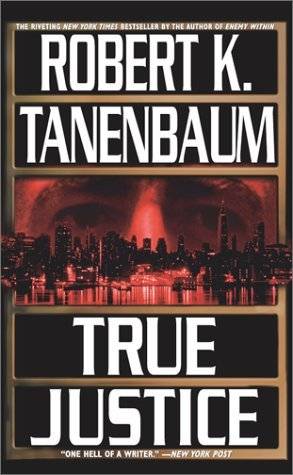

True Justice
by Robert K. Tanenbaum
District Attorney Butch Karp and his pistol-packing wife Marlene Ciampi, the liveliest crime-fighting couple in New York, are back in True Justice. The first set of infanticides happen on Butch's watch: a wave of gruesome incidents in which newborns are killed or abandoned by their indigent teenage mothers. The second, Marlene's case, is straight out of the headlines: a middle-class college girl and her boyfriend are indicted for first-degree murder in the death of their baby after a concealed pregnancy. The most interesting story belongs to Lucy, Butch and Marlene's teenage daughter, an incisively brilliant and complex young woman who deserves her own novel. Lucy's best friend's parents seem to have been murdered by an African furniture restorer of whose guilt Lucy is unconvinced. The real solution to the mystery of who killed the Maxwells is telegraphed well in advance, but all the crimes give Butch, Marlene, their colleagues in criminal justice, and even Lucy a chance to weigh in on the law's fault lines and the ironies implicit in what passes for justice in America. But it's Lucy's spiritual quest that provokes the book's most unusual and involving drama. Lucy's devout Catholic faith, like her prodigious talent for language (she can speak 14, but give her five days in a foreign country and that'll be 15, thank you), is a mystery to Butch, a lapsed Jew, and Marlene, who has trouble squaring her own faith with the violence that attends her job. When a Jesuit priest tries to explain it in the following passage, Butch is nonplused: "Lucy takes her spiritual responsibilities very seriously. And of course, in the current age, when people think there's no such thing as spiritual responsibility, she has nothing to compare herself to, and so she may get herself painted into a corner." "I'm not sure I follow," said Karp. "Oh, I mean, two or three hundred years ago, a girl with her talents and predilections would have been in an order, with hourly guidance and a rule to follow. Think of Mickey Mantle being born in, say, Romania in 1830. The talent's there, but there's no cultural space for it." This is a keenly intelligent book, many cuts above the usual courtroom procedural. The most interesting things happen outside the courtroom--the moral dilemmas, the political choices, the bonds between parents and daughter. The pacing is as swift as the dialogue, the characters are piercingly illuminated, and the philosophical jousting is worth a room full of Jesuits. This reader is heading straight for Tanenbaum's backlist and eagerly anticipating another novel with Lucy as the star. --Jane Adams
Release Date:
July 30, 2001

